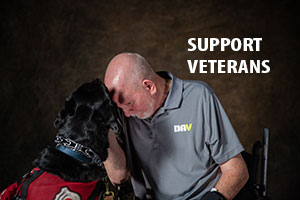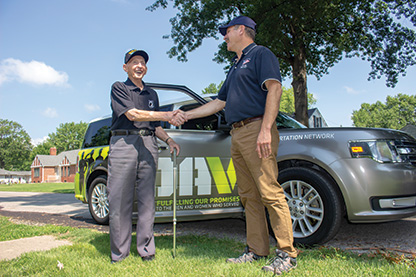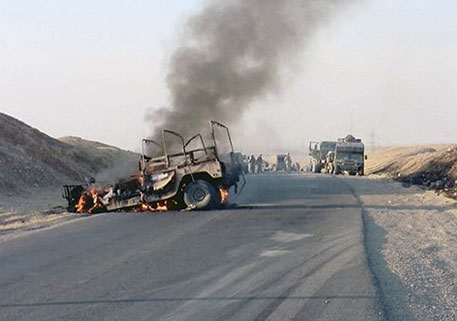VA Survivor Benefits
For surviving spouses, children or parents of a deceased veteran, Department of Veterans Affairs survivors benefits provide crucial financial support and assistance. This article explores the various types of VA benefits for surviving spouses and other family members.
Understanding VA survivors benefits
VA Survivors Pension
The VA Survivors Pension is one of two VA surviving spouse benefits that is a monthly payment for eligible dependents. It’s available to an unremarried surviving spouse or unmarried children of a veteran with honorable wartime service and whose death was unrelated to service. According to the VA, since this is a needs-based benefit; the monthly amount is regulated by income and net worth limits set by Congress.
Survivors of peacetime veterans are not entitled to the VA Survivors Pension. However, if the veteran’s death was the result of service-connected disability, dependents may be entitled to VA Dependency and Indemnity Compensation (DIC). Survivors are not eligible for both.
Note: The VA Survivors Pension is different than the Department of Defense’s Survivor Benefit Plan (SBP).
VA Dependency and Indemnity Compensation
DIC is a monthly benefit paid to the qualifying surviving spouse, children or parents of a veteran who died either:
- In the line of duty
- As the result of a service-connected disability
- With a service-connected disability as a contributing factor in death
- From a conditioned worsened by a service-connected disability
DIC may also be paid to certain survivors of veterans whose service-connected disabilities did not cause their deaths. To be eligible, for VA purposes, at the time of death, the veteran must have been considered totally disabled (unable to work). Additionally, the veteran must have been continuously rated as totally disabled either:
- For a period of 10 years immediately preceding death
- From their date of military discharge and for at least five years immediately preceding death
- For a period of at least one year immediately preceding death and was a former prisoner of war who died after Sept. 30, 1999
According to the VA, a veteran’s surviving family members who believe they’re eligible for DIC under the PACT Act should submit a new application. DAV benefits advocates can help with this application. To find one near you, visit benefitsquestions.org.
In certain circumstances, remarried spouses may still be eligible to continue to receive DIC if they remarried on or after either:
- 16, 2003, and were 57 or older at that time
- 5, 2021, and were 55 or older at that time
Note: The veteran must have been discharged or released under conditions other than dishonorable from the period of active service in which the disability responsible for their death was incurred or aggravated. The veteran’s death must not have been the result of their own willful misconduct. See current DIC rates.
If a survivor is eligible for both DIC and the VA Survivors Pension, the VA will only pay the one benefit that provides the most money. Survivors can’t get payments from both.
Additional VA survivors benefits
Aid and attendance
Survivors who qualify for DIC or a VA Survivors Pension may also be eligible for an additional monthly amount paid for aid and attendance or housebound benefits.
Survivors may be eligible for aid and attendance if they are in need of regular assistance by another person. Such needs exist when they are unable to feed themselves, dress or undress themselves, or keep themselves ordinarily clean and presentable. Eligibility may also be shown when they are unable to attend to the wants of nature; or have an incapacity, physical or mental, that requires care or assistance on a regular basis to protect from hazards or dangers incident to their daily environment. Survivors who are patients in a nursing home because of physical or mental incapacity are considered in need of regular aid and attendance.
Housebound benefits may be warranted when the survivor is found to be permanently bound or confined by a permanent disability, or disabilities, to their home or premises.
Civilian Health and Medical Program of the Department of Veterans Affairs
A surviving spouse or child may be eligible for health care benefits through the Civilian Health and Medical Program of the Department of Veterans Affairs (CHAMPVA). This is a cost-sharing program with the VA, meaning through CHAMPVA, the VA covers the cost of some health care services and supplies for eligible beneficiaries.
If a survivor qualifies for TRICARE, they aren’t entitled to CHAMPVA. Survivors may be eligible for CHAMPVA if they don’t qualify for TRICARE and the deceased veteran either:
- Died from a VA-rated service-connected disability.
- Was rated permanently and totally disabled from a service-connected disability at the time of their death.
- Died in the line of duty, not due to misconduct. (In most cases, these family members are eligible for TRICARE, not CHAMPVA.)
Also, spouses and dependent children of a veteran who is permanently and totally disabled from service-connected disability may also qualify for CHAMPVA.
Services and supplies covered when determined medically necessary by the VA, and the services were provided by a VA-authorized provider, include:
- Ambulance service
- Durable medical equipment (DME)
- Family planning and maternity
- Hospice
- Inpatient care
- Mental health care
- Outpatient care and procedures
- Pharmacy (prescription medicines)
- Skilled nursing care
- Organ transplants
For more information, see the CHAMPVA Guide.
Education and training benefits
Fry Scholarship
The surviving spouse and children of a veteran who died in the line of active duty on or after Sept. 11, 2001, may be eligible for benefits under the Marine Gunnery Sergeant John David Fry Scholarship. The Fry Scholarship provides Post-9/11 GI Bill benefits to eligible survivors to attend school for up to 36 months at the 100% rate.
A surviving spouse may receive DIC while using the Fry Scholarship. However, any children over the age of 18 will relinquish DIC upon using the Fry Scholarship.
Survivors’ and Dependents’ Educational Assistance
A veteran’s surviving spouse and children may be eligible for educational benefits from the Survivors’ and Dependents’ Education Assistance (DEA) program, also known as Chapter 35 benefits for dependents. This benefit may be used in pursuing education and training, including degree, certificate, apprenticeship and on-the-job training programs. Only a surviving spouse or children (which include stepchildren and adopted children) are eligible.
The veteran must have either died of a service-connected disability, had permanent and total service-connected disability at the time of death, or died while a disability so evaluated was in existence. The spouse of a service member missing in action is also eligible.
The period of entitlement for surviving spouses or children depends on when they became eligible for the benefit. There are more restrictions to time limits if they became eligible before Aug. 1, 2023. There are less restrictions if they became eligible after that date. For specific eligibility and time limits, visit Survivors’ and Dependents’ Educational Assistance.
Montgomery GI Bill death benefit
According to the VA Office of Survivors Assistance, the VA will pay a special Montgomery GI Bill (MGIB) death benefit to a designated survivor in the event of a service-connected death of a service member while on active duty or within one year after discharge or release. The deceased must either have been entitled to educational assistance under the MGIB program or a participant in the program who would have been so entitled but for the high school diploma or length-of-service requirement. The amount paid will be equal to the participant’s actual military pay reduction, less any education benefits paid.
Benefits for children born with spina bifida to veterans who served in Vietnam, Thailand or near the Korean Demilitarized Zone
Surviving biological children of veterans who served in the Republic of Vietnam or Thailand for any length of time during the period between Jan. 9, 1962, and May 7, 1975, or who served in or near the Korean Demilitarized Zone (DMZ) during the period between Sept. 1, 1967, and Aug. 31, 1971, born with spina bifida may be eligible for a monthly monetary allowance and vocational training, if reasonably feasible.
The child must have been conceived after the date on which the veteran first entered the Republic of Vietnam, Thailand or the DMZ.
A monetary allowance is paid at one of three disability levels based on the severity of disability. For current rates, visit the VA’s birth defect compensation rates page.
Benefits for children born with certain birth defects to women Vietnam veterans
Biological children of women veterans who served in Vietnam at any time during the period between Feb. 28, 1961, and May 7, 1975, may be eligible for certain benefits because of birth defects associated with the mother’s service in Vietnam that resulted in the child’s permanent physical or mental disability. The covered birth defects don’t include conditions due to family disorders, birth-related injuries, or fetal or neonatal infirmities with well-established causes.
A monetary allowance is paid at one of four disability levels based on the child’s degree of permanent disability. For current rates, visit the VA’s birth defect compensation rates.
VA Home Loan Guaranty
A VA loan guaranty to acquire a home may be available to an unremarried spouse of a veteran or service member who died as a result of service-connected disabilities, a surviving spouse who remarries after age 57, or a spouse of a service member officially listed as missing in action (MIA) or who is currently a prisoner of war (POW) for more than 90 days. Spouses of those listed MIA/POW are limited to one loan. Surviving spouses of certain totally disabled veterans, whose disability may not have been the cause of death, may also be eligible for VA loan guaranty.
The loan may be used to purchase, construct or improve a home; purchase a manufactured home and/or lot; or refinance existing mortgages or other liens on a dwelling owned as the surviving spouse’s home.
Burial benefits from the National Cemetery Administration
Eligible veterans, their spouses and dependents can be buried in one of the national cemeteries maintained by the VA. Note, this doesn’t include Arlington National Cemetery, which is maintained by the Department of the Army.
Burial benefits for spouses and children in these cemeteries include burial with the veteran, opening and closing of the grave, a burial liner, a government-provided headstone or marker, and perpetual care of the gravesite. Since the VA typically only includes one headstone and gravesite for all eligible family members, all engravings would go on that single headstone.
Veterans buried at these sites also qualify for a burial flag, a Presidential Memorial Certificate (PMC), military funeral honors by the Department of Defense, and veterans burial allowance and transportation benefits.
Note: When veterans are buried at private cemeteries, the government provides a headstone or marker, a burial flag and a PMC for the veteran only. The VA also may pay for some of the burial and funeral expenses. Many states have their own veteran cemeteries, which may have state residency requirements.
Additional non-VA survivors benefits
Survivor Benefit Plan
The Survivor Benefit Plan (SBP) is a program administered by the Department of Defense, not the VA.
Survivors of military retirees may be eligible to receive a monthly payment or annuity if the deceased veteran opted in and continued paying for an SBP. It’s a type of insurance plan veterans can elect upon retirement from military service. They pay monthly premiums from their gross (pretax) retired pay. With SBP, beneficiaries may receive up to 55% of the veteran’s retirement pay as a lifetime annuity after the retiree’s death. Beneficiaries may include the surviving spouse, former spouse, children or a disabled dependent. In cases where the deceased didn’t have a spouse or children, another person of natural insurable interest, such as a brother or sister, may be eligible.
In 2023, Congress eliminated reductions in SBP payments for surviving spouses if they were also in receipt of DIC payments from the VA. This means surviving spouses may be eligible for concurrent payments of both benefits.
The SBP is protected from inflation and receives an annual cost-of-living adjustment, similar to retirement pay. More information can be found at the DOD’s Survivor Benefits Program website.
Death gratuity
A surviving spouse or child may be eligible for a death gratuity from the DOD if the deceased veteran died on active duty, active or inactive duty for training, or within 120 days of release from active duty if the death was the result of a disability related to their military service. If there’s no surviving spouse or child, then parents or siblings designated as next of kin by the service member may be eligible.
Fee-free passports
Fee-free passports are available to immediate family members (spouse, children, parents, brothers and sisters) for the purpose of visiting their loved one’s grave or memorialization site at an American military cemetery on foreign soil. For additional information, call 703-584-1501 or visit abmc.org/contact-us. If you’re using the online contact form, select “Letter Authorizing Fee-free Passports” from the “I would like information regarding” drop-down options.
Resources
How can I apply for VA benefits?
If a veteran of any era was injured, fell ill or suffered a trauma during their time in the military, they may wish to file a claim for disability benefits through the VA to have that condition verified as service-connected, thus making them eligible for necessary health care coverage and other earned benefits.
It can be helpful to enlist the help of a professional benefits expert to guide them through the process. Many, like those at DAV, provide their expertise and service at absolutely no cost to the service member, veteran or their family. Find a DAV benefits advocate by visiting DAV’s online locator.
Current military members looking for assistance as they separate from service can visit one of DAV’s transition service offices.
Don’t see an office nearby? DAV has local chapters and departments throughout the country, and most are staffed by trained veteran experts who can help facilitate benefits claims. Check the DAV information seminar schedule to see if one will be conducted in your area soon.
For assistance or to ask questions about your claim status, call the Veterans Benefits Administration national call center at 800-827-1000.
Additional resources
VA Office of Survivors Assistance
VA Benefits for Family and Caregivers
VA Office of Survivors Assistance FAQ
VA Office of Survivors Assistance Contacts
VA Burial Benefits
VA Survivors Pension
VA Current Survivors Pension Benefit Rates









